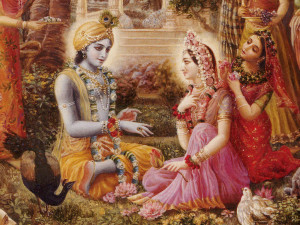
Question:
“I have seen many scholars and devotees of Krsna suggest that the Lord does not have any form. They suggest that 5000 years ago the Lord incarnated as Krsna, however, this form of Krsna is not the original form of the Lord. The Lord does not have any definite form.”
Answer:
This debate has gone on from time immemorial, as to whether the absolute truth is formless or whether He possesses an eternal spiritual form. The root of this doubt comes from the envy within the hearts of the conditioned living entity. Ultimately it is the living entity refusing to accept that we are subservient to the Lord, and trying to establish ourselves as the same one supreme absolute. The Vedic texts state in very clear terms the supreme position of Lord Krishna and the eternality of His spiritual form.
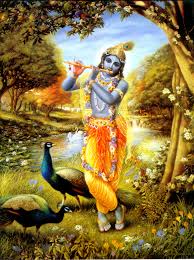
Lord Krishna
In the Gopala Tapani Upanishad we find the following verse:
tam ekam govindam sac-cid-ananda-vigraham
“Govinda is the one Absolute Truth. He possesses a spiritual body composed of eternality, knowledge and bliss.”
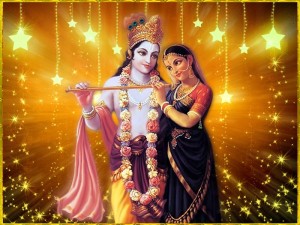
Sri Sri Radha and Krishna
Elsewhere it is stated:
om sac-cid-ananda rupaya krishnaya namah#
“I offer my obeisances unto Lord Krishna who possesses a spiritual form of eternality, knowledge and bliss.”
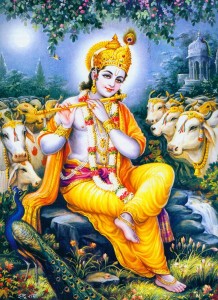
Bhagavan Lord Krishna
In the Sri Brahma Samhita a similar verse is found:
isvarah paramah krsnah
sac-cid-ananda-vigrahah
anadir adir govindah
sarva-karana-karanam
“Krishna who is known as Govinda is the Supreme Godhead. He has an eternal blissful spiritual body. He is the origin of all. He has no other origin and He is the prime cause of all causes.”
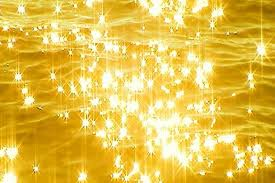
Brahman
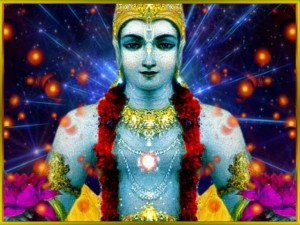
The Supersoul Paramatma
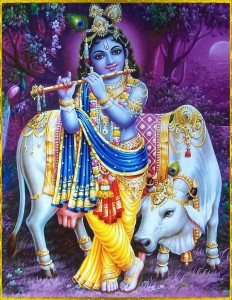
Bhagavan Sri Krishna
In the Srimad Bhagavatam we learn that the Absolute Truth possesses three features:
vadanti tat tattva-vidas
tattvam yaj jnanam advayam
brahmeti paramatmeti
bhagavan iti sabdyate
“The Absolute Truth is realized in three phases of understanding by the knower of the Absolute Truth, and all of them are identical. Such phases of the Absolute Truth are expressed as Brahman, Paramatma, and Bhagavan.”
The impersonal, all-pervasive aspect of the Absolute Truth is the brahma-jyoti. One who realizes this feature of the Lord experiences the quality of eternality (sat). The localized presence of the Lord within the hearts of all living entities is the Paramatma. The yogis who realize this form of the Lord experience the qualities of eternality and knowledge (sat and cit). The personalized form of the Lord in the spiritual abode of Vaikuntha is the Bhagavan feature.. The devotees who realize this form of the Lord experience the qualities of eternality, knowledge and bliss (sat, cit and ananda). The complete understanding of the Absolute Truth entails comprehension of all three aspects of the Lord.
In the Bhagavad Gita (14.27) the Lord declares Himself to be the source of the impersonal Brahman:
brahmano hi pratisthaham
“I am the foundation of the impersonal brahman.”
It is not that Krishna is manifesting from the impersonal, but the impersonal brahmajyoti is manifesting from Lord Krishna.
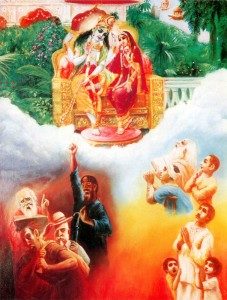
Elsewhere in the Gita Krishna firmly establishes the spirituality of His form.
avajananti mam mudha
manusim tanum asritam
param bhavam ajananto
mama bhuta-mahesvaram
“Fools deride Me when I descend in the human form. They do not know My transcendental nature as the Supreme Lord of all that be.”
The impersonalists fail to comprehend the existence of spiritual form. Their experience of material form has led them to believe form is the cause of material suffering. Having seen that form has brought them so much suffering, they are eager to become free from all forms and designations. As such they cannot accept that the Absolute also possesses a form. But the form of the Lord is transcendental to this mundane existence and is not limiting as our own material forms are.
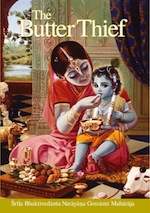
This is why Lord Krishna describes Himself as follows:
janma karma ca me divyam
“My birth and activities are transcendental.”
In the Brahma Samhita we find the following statement:
advaitam acyutam anadim ananta-rupam
“The Lord possesses unlimited spiritual forms, all of which are beginningless.”
The Lord’s forms are anadih, without any beginging. It is not that the Lord assumes a form. These forms are eternally existing in the spiritual realm. In the Gita Krishna confirms this:
na tv evaham jatu nasam
na tvam neme janadhipah
na caiva na bhavisyamah
sarve vayam atah param
“Never was there a time when I did not exist, nor you, nor all these kings; nor in the future shall any of us cease to be.”
Here Lord Krishna establishes the eternality of each and every individual. If they were all parts of the nondual absolute, Krishna could simply have said, “Never was there a time when I did not exist.” But he says, “Nor you, nor all these kings.” And in the future non of them shall cease to be. Their individuality is eternal. Never was there a time when Lord Krishna did not exist, nor in the future will He cease to be. Lord Krishna’s personality is eternal, as confirmed throughout the Vedic texts.
There is no truth higher than Lord Krishna. Lord Krishna is not manifesting from some higher impersonal truth. Krishna is the Absolute Truth, as He Himself says:
mattah parataram nanyat
kincid asti dhananjaya
mayi sarvam idam protam
sutre mani-gana iva
“O conqueror of wealth, there is no truth superior to Me. Everything rests upon Me, as pearls are strung on a thread.”
Throughout the Bhagavad Gita Krishna repeatedly uses the words “Me” and “I”. He says “surrender to Me”, “worship Me”, “I am the source of everything”, “I am the supreme truth”, etc. We don’t find him saying, “Surrender to the unmanifested truth within Me, from which I came, into which I will go, the formless, tasteless, deaf, dumb, and lame brahman within my kidney.” And on practically every page of the Gita we find the phrase “sri bhagavan uvaca” -“The Supreme Personality of Godhead said”. It is Bhagavan who is speaking, the personal form of the Lord. So when he says surrender to Me, the direct meaning is surrender to Bhagavan, the supreme person. And this is how Arjuna understood it, because he says it himself:
param brahma param dhama
pavitram paramam bhavan
purusam sasvatam divyam
adi-devam ajam vibhum
ahus tvam rsayah sarve
devarsir naradas tatha
asito devalo vyasah
svayam caiva bravisi me
“Arjuna said: You are the Supreme Personality of Godhead, the ultimate abode, the purest, the Absolute Truth. You are the eternal, transcendental, original person, the unborn, the greatest. All the great sages such as Narada, Asita, Devala and Vyasa confirm this truth about You, and now You Yourself are declaring it to me.”
This is Arjuna’s conclusion as to who is Krishna. He begins by saying Krishna is param brahma – the Supreme Absolute Truth. The Vedic texts state that everything is brahman – sarvam khalv idam brahma. Everything is ultimately belonging to the spiritual nature on the absolute platform, because it is all an emanation from the Absolute. Though they are all brahman (spiritual in nature), there is a difference between the emanation and the source. Therefore Arjuna uses the words param brahma. If there is only nonduality, where is the question of qualifying it with the word “supreme” (param)? Good, better and best can only be used when there is variety. Otherwise one can refer to the same supreme brahman as the worst brahman. For nonduality, both statements are equally meaningless.
Arjuna refers to Krishna as param dhama, the supreme abode. In the Gita Krishna says “Everything is resting on Me as pearls are strung on a thread.”
Krishna is then described as pavitram paramam, or supremely pure. This confirms that Lord Krishna’s body was spiritual and not the manifestation of the sattva-guna, as claimed by impersonalists. The Lord is nirguna, not contaminated by the modes of material nature (sattva, rajas and tamas). His body is completely spiritual and transcendental to this material realm.
Then Arjuna uses the words purusham shashvatam divyam. This is as clear as it could possibly be. “You are the eternal transcendental person.” The Lord’s personality is eternal and spiritual. And this is not just Arjuna’s conclusion, but that of all the great sages such as Narada, Asita, Devala and Sri Vyasadeva, the compiler of all Vedic knowledge.
Ultimately one can understand Krishna only through devotion, as stated in the Gita:
bhaktya mam abhijanati
yavan yas casmi tattvatah
“One can understand Me as I am, as the Supreme Personality of Godhead, only by devotional service.”
By denying the supremacy of Lord Krishna’s personality, the impersonalists lose the ability to perform true devotion to the Lord. Lacking devotion, they fail to understand Krishna in truth, and take shelter of speculative thoughts and philosophies which further deny His personality. Thus they are unable to understand the Absolute Truth in three features, and are ultimately bewildered into considering themselves as the supreme. This is the last snare of maya which catches the spiritualist on the path of self realization.
In attempting to become free from the conditionings of ahankara (false ego), they have expanded their false identification to the superlative degree.
The Bhagavad Gita describes this:
ahankara-vimudhatma
kartaham iti manyate
“Being bewildered by ahankara, the foolish soul thinks ‘I am the cause’.”
What is ahankara? The conception that “I am (aham) the cause (kara)” Thus when the transcendentalist comes to the point of ‘kartaham iti manyate’, thinking, “Ultimately I am the cause of all causes,” he is factually on the platform of ‘ahankara-vimudhatma’, a foolish soul completely bewildered by ahankara.
——–
Question:
“Are there any clear and definite references in the Vedic literature which can clearly show that Krsna is the original form of the Lord and that the Lord does have a personal form eg. dark blue colour, has flute, and carries a peacock feather on his head etc.”
Answer:
There are countless verses which describe the appearance of the Lord. Already this is quite long, so I will avoid listing many quotes and just quote one line:
yam shyamasundaram acintya-guna-svarupam
“The Lord’s original form is a beautiful dark blue color and He possesses unlimited wonderful qualities.”
—–
Question:
“In Bhagavad Gita is Sri Krishna asking Arjun to focus on Sri Krsna’s personal form?”
Answer:
Krishna is asking Arjuna to focus his mind on His own form, His sva-rupa, which was standing there before Arjuna. It is impossible to perform anusmaranam on something that possesses no qualities. To think of the non-existent or that which is beyond qualities is impossible. You can confirm this yourself by trying it. Think of something which doesn’t exist. Now analyse that thought in terms of its individual qualities. Every single individual quality already exists. You have only combined many existing entities together, you have not thought of something that does not exist. You may think of a gold mountain, but gold exists, as do mountains. It is impossible to think of something that does not exist.
Now try to think of something without qualities. How is it visualized in your mind? What is it that creates a thought? A combination of qualities is the basis of a thought. It is simple to make a statement like “meditate on the unmanifested within your heart”, but it is impossible to accomplish. You can simply meditate on what the unmanifested is not, not what it is. Thus the Upanishads utilize the ‘neti’ process. “It is not this, it is not that.”

 Posted in
Posted in 






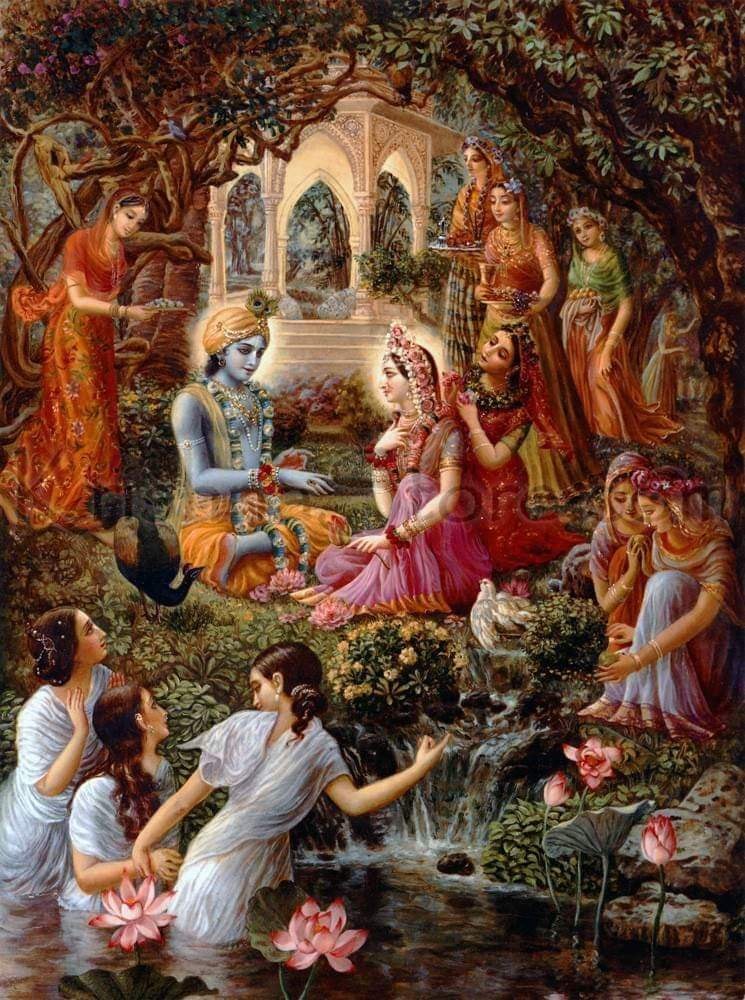
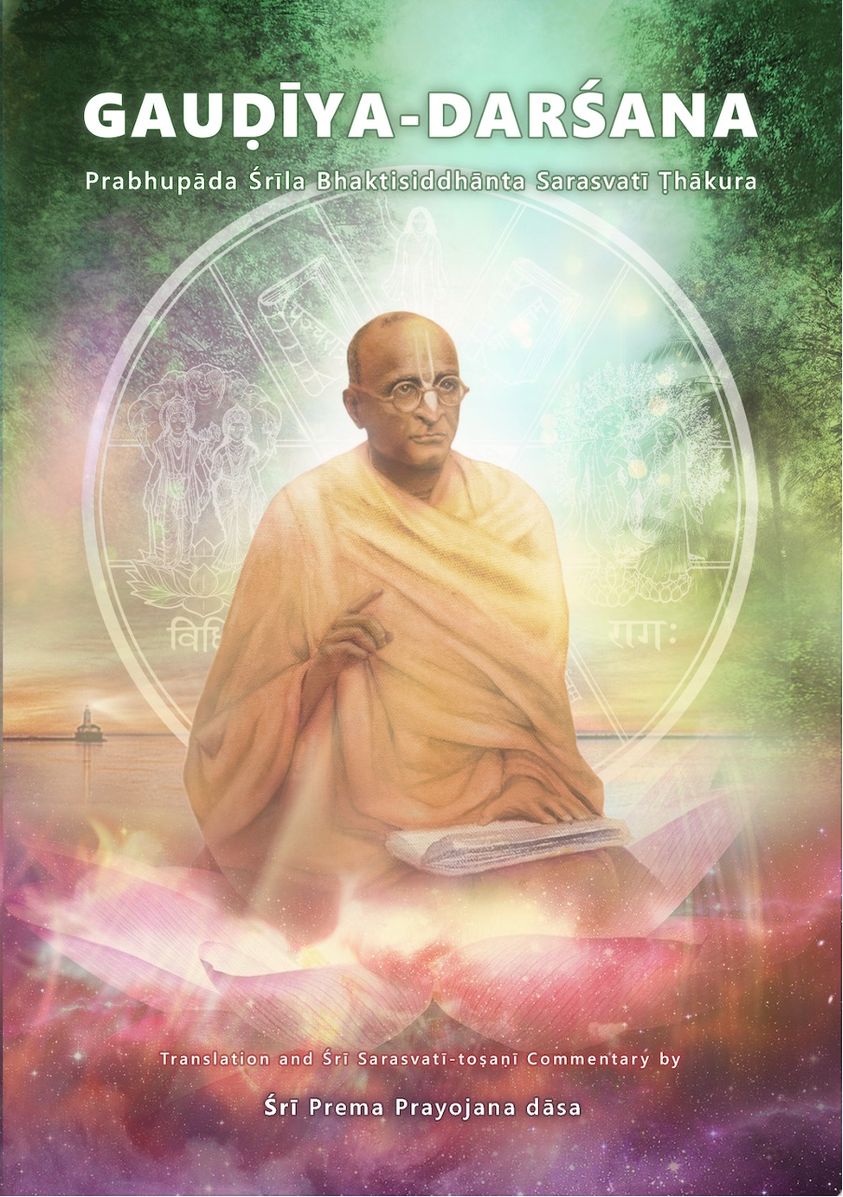

Who declares God incarnate as Krsna?
Thanks
For this you have to read the Bhagavad Gita which is an enormously transcendental scripture. In it Lord Krishna teaches Arjuna who is His first disciple. As you read it soon becomes clear who Krishna is and why and how He is the Supreme Being. There are many other texts to and in all the Vedas Lord Krishna is revealed to be the Supreme Personality. Anything i write myself here as to why and how would be insufficient. But in short, in this day and age and in this very life it is an incredible and most fortunate occasion to find out about all this.
Please download the Bhagavad Gita for free from here.
http://www.purebhakti.com/resources/ebooks-a-magazines-mainmenu-63/bhakti-books/english/32-bhagavad-gita/file.html
Krishna spoke the Bhagavad Gita When you read the Bhagavad Gita, you realize the Truth.
Please accept this free copy Courtesy of Isa das prabhu
http://www.purebhakti.com/resources/ebooks-a-magazines-mainmenu-63/bhakti-books/english/32-bhagavad-gita/file.html
I love the story of the god of sri krishna